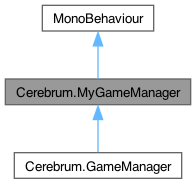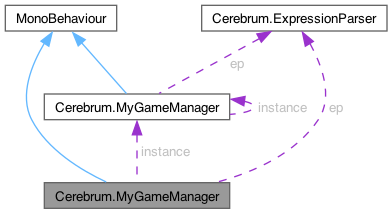|
| Dictionary< string, GameObject > | gos = new Dictionary<string, GameObject>() |
| |
| Dictionary< string, string > | fullnames = new Dictionary<string, string>() |
| |
| bool | objectCreated = false |
| |
| GameObject[] | m_gameObjects |
| |
◆ Awake()
| virtual void Cerebrum.MyGameManager.Awake |
( |
| ) |
|
|
protectedvirtual |
◆ CheckForDebugCanvas()
| bool Cerebrum.MyGameManager.CheckForDebugCanvas |
( |
| ) |
|
|
protected |
◆ Create()
| virtual GameObject Cerebrum.MyGameManager.Create |
( |
string |
objPrefabName | ) |
|
|
virtual |
◆ CreateObject()
| virtual IEnumerator Cerebrum.MyGameManager.CreateObject |
( |
string |
objPrefabName | ) |
|
|
virtual |
◆ dprint()
| void Cerebrum.MyGameManager.dprint |
( |
string |
str | ) |
|
◆ executeScenarioFiles()
| IEnumerator Cerebrum.MyGameManager.executeScenarioFiles |
( |
string[] |
fileNames | ) |
|
|
protected |
◆ FindGameObject()
| virtual GameObject Cerebrum.MyGameManager.FindGameObject |
( |
string |
objName | ) |
|
|
virtual |
◆ FindGameObjects()
| static GameObject[] Cerebrum.MyGameManager.FindGameObjects |
( |
string |
objName | ) |
|
|
staticprotected |
Find children objects of objName for commands meant for multiple objects Supports ANY and ALL patterns e.g.: Lights/ALL Returns list of children
◆ FindInaciveGameObject()
| static GameObject Cerebrum.MyGameManager.FindInaciveGameObject |
( |
string |
objName | ) |
|
|
static |
Find game object even if it is inactive.
◆ processObjectCommand()
| bool Cerebrum.MyGameManager.processObjectCommand |
( |
GameObject |
go, |
|
|
string |
command, |
|
|
string |
cparams, |
|
|
out string |
retString |
|
) |
| |
|
protected |
Send a GameObject command to appropriate GameObject(s)
◆ processObjectsCommand()
| virtual bool Cerebrum.MyGameManager.processObjectsCommand |
( |
string |
objName, |
|
|
string |
command, |
|
|
string |
cparams, |
|
|
out string |
retString |
|
) |
| |
|
protectedvirtual |
Process commands meant for multiple objects Supports ANY and ALL patterns e.g.: Lights/ALL
Reimplemented in Cerebrum.GameManager.
◆ RemoveGameObject()
| virtual void Cerebrum.MyGameManager.RemoveGameObject |
( |
string |
objName | ) |
|
|
virtual |
◆ Start()
| virtual void Cerebrum.MyGameManager.Start |
( |
| ) |
|
|
protectedvirtual |
◆ createdGameObject
| GameObject Cerebrum.MyGameManager.createdGameObject = null |
◆ currentFileName
| string Cerebrum.MyGameManager.currentFileName |
◆ debugBox
| bool Cerebrum.MyGameManager.debugBox =false |
◆ debugCanvas
| bool Cerebrum.MyGameManager.debugCanvas =false |
◆ debugCommandEntry
| bool Cerebrum.MyGameManager.debugCommandEntry =false |
◆ debugCommandList
| string [] Cerebrum.MyGameManager.debugCommandList |
◆ debugCommands
| bool Cerebrum.MyGameManager.debugCommands =false |
◆ DebugDialog
| string Cerebrum.MyGameManager.DebugDialog |
◆ DebugDialogText
| Text Cerebrum.MyGameManager.DebugDialogText |
◆ DebugLog
| bool Cerebrum.MyGameManager.DebugLog = false |
|
static |
◆ debugStatementsDelay
| float Cerebrum.MyGameManager.debugStatementsDelay = 0f |
◆ Dialog
| string Cerebrum.MyGameManager.Dialog |
◆ Dialog1
| string Cerebrum.MyGameManager.Dialog1 |
◆ Dialog1Texture
| Texture2D Cerebrum.MyGameManager.Dialog1Texture = null |
◆ Dialog2
| string Cerebrum.MyGameManager.Dialog2 |
◆ Dialog2Texture
| Texture2D Cerebrum.MyGameManager.Dialog2Texture = null |
◆ DialogOffset
| float Cerebrum.MyGameManager.DialogOffset = 0.8f |
◆ DialogPadding
| RectOffset Cerebrum.MyGameManager.DialogPadding |
◆ DialogTexture
| Texture2D Cerebrum.MyGameManager.DialogTexture = null |
◆ DialoguePadding
| RectOffset Cerebrum.MyGameManager.DialoguePadding |
◆ displayLastCommands
| bool Cerebrum.MyGameManager.displayLastCommands = false |
◆ ep
◆ fullnames
| Dictionary<string, string> Cerebrum.MyGameManager.fullnames = new Dictionary<string, string>() |
|
protected |
◆ gameDelay
| float Cerebrum.MyGameManager.gameDelay = 0.0f |
◆ gos
| Dictionary<string, GameObject> Cerebrum.MyGameManager.gos = new Dictionary<string, GameObject>() |
|
protected |
◆ instance
◆ m_gameObjects
| GameObject [] Cerebrum.MyGameManager.m_gameObjects |
|
protected |
◆ maxJumpsPerFrame
| int Cerebrum.MyGameManager.maxJumpsPerFrame = 10 |
◆ MyDebugLog
| bool Cerebrum.MyGameManager.MyDebugLog = false |
◆ objectCreated
| bool Cerebrum.MyGameManager.objectCreated = false |
|
protected |
◆ ScenarioFiles
| string [] Cerebrum.MyGameManager.ScenarioFiles |
◆ scenarioPath
| string Cerebrum.MyGameManager.scenarioPath ="Scenarios" |
◆ tempCommand
| string Cerebrum.MyGameManager.tempCommand ="" |
The documentation for this class was generated from the following file:











